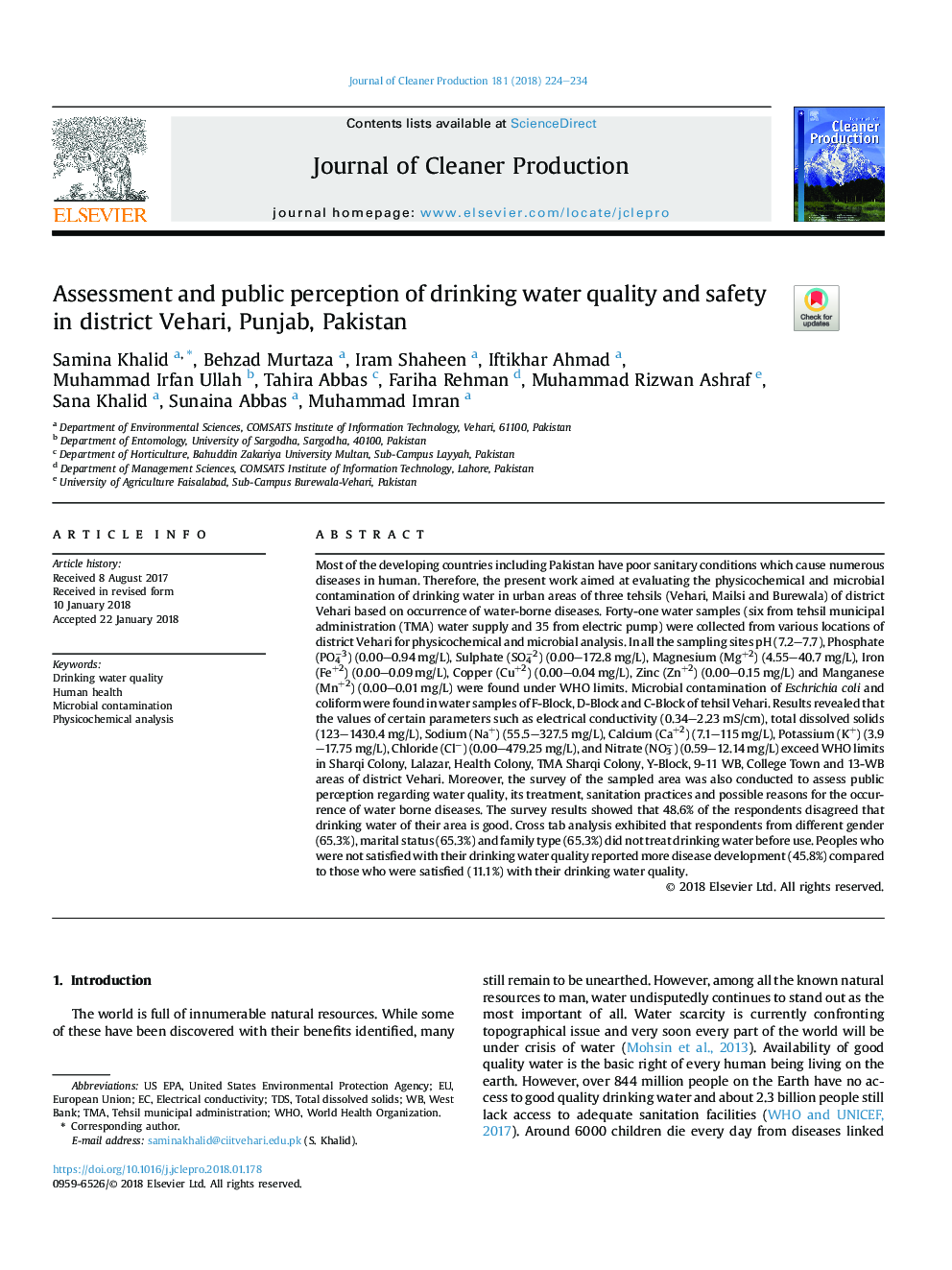| کد مقاله | کد نشریه | سال انتشار | مقاله انگلیسی | نسخه تمام متن |
|---|---|---|---|---|
| 8097615 | 1522072 | 2018 | 11 صفحه PDF | دانلود رایگان |
عنوان انگلیسی مقاله ISI
Assessment and public perception of drinking water quality and safety in district Vehari, Punjab, Pakistan
ترجمه فارسی عنوان
ارزیابی و درک عمومی از کیفیت و ایمنی آب آشامیدنی در وحشی، پنجاب، پاکستان
دانلود مقاله + سفارش ترجمه
دانلود مقاله ISI انگلیسی
رایگان برای ایرانیان
کلمات کلیدی
TDSTMAUS EPA - EPA ایالات متحدهMicrobial contamination - آلودگی میکروبیUnited States Environmental Protection Agency - آژانس حفاظت از محیط زیست ایالات متحدهEuropean Union - اتحادیه اروپاWest Bank - بانک غربPhysicochemical analysis - تجزیه و تحلیل فیزیکوشیمیاییElectrical conductivity - رسانایی الکتریکیWorld Health Organization - سازمان بهداشت جهانیHuman health - سلامتی انسانTotal dissolved solids - مجموع جامدات حل شدهWHO - کهDrinking water quality - کیفیت آب آشامیدنی
موضوعات مرتبط
مهندسی و علوم پایه
مهندسی انرژی
انرژی های تجدید پذیر، توسعه پایدار و محیط زیست
چکیده انگلیسی
Most of the developing countries including Pakistan have poor sanitary conditions which cause numerous diseases in human. Therefore, the present work aimed at evaluating the physicochemical and microbial contamination of drinking water in urban areas of three tehsils (Vehari, Mailsi and Burewala) of district Vehari based on occurrence of water-borne diseases. Forty-one water samples (six from tehsil municipal administration (TMA) water supply and 35 from electric pump) were collected from various locations of district Vehari for physicochemical and microbial analysis. In all the sampling sites pH (7.2-7.7), Phosphate (PO4â3) (0.00-0.94â¯mg/L), Sulphate (SO4â2) (0.00-172.8â¯mg/L), Magnesium (Mg+2) (4.55-40.7â¯mg/L), Iron (Fe+2) (0.00-0.09â¯mg/L), Copper (Cu+2) (0.00-0.04â¯mg/L), Zinc (Zn+2) (0.00-0.15â¯mg/L) and Manganese (Mn+2) (0.00-0.01â¯mg/L) were found under WHO limits. Microbial contamination of Eschrichia coli and coliform were found in water samples of F-Block, D-Block and C-Block of tehsil Vehari. Results revealed that the values of certain parameters such as electrical conductivity (0.34-2.23â¯mS/cm), total dissolved solids (123-1430.4â¯mg/L), Sodium (Na+) (55.5-327.5 mg/L), Calcium (Ca+2) (7.1-115â¯mg/L), Potassium (K+) (3.9-17.75â¯mg/L), Chloride (Clâ) (0.00-479.25â¯mg/L), and Nitrate (NO3â) (0.59-12.14â¯mg/L) exceed WHO limits in Sharqi Colony, Lalazar, Health Colony, TMA Sharqi Colony, Y-Block, 9-11 WB, College Town and 13-WB areas of district Vehari. Moreover, the survey of the sampled area was also conducted to assess public perception regarding water quality, its treatment, sanitation practices and possible reasons for the occurrence of water borne diseases. The survey results showed that 48.6% of the respondents disagreed that drinking water of their area is good. Cross tab analysis exhibited that respondents from different gender (65.3%), marital status (65.3%) and family type (65.3%) did not treat drinking water before use. Peoples who were not satisfied with their drinking water quality reported more disease development (45.8%) compared to those who were satisfied (11.1%) with their drinking water quality.
ناشر
Database: Elsevier - ScienceDirect (ساینس دایرکت)
Journal: Journal of Cleaner Production - Volume 181, 20 April 2018, Pages 224-234
Journal: Journal of Cleaner Production - Volume 181, 20 April 2018, Pages 224-234
نویسندگان
Samina Khalid, Behzad Murtaza, Iram Shaheen, Iftikhar Ahmad, Muhammad Irfan Ullah, Tahira Abbas, Fariha Rehman, Muhammad Rizwan Ashraf, Sana Khalid, Sunaina Abbas, Muhammad Imran,
